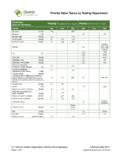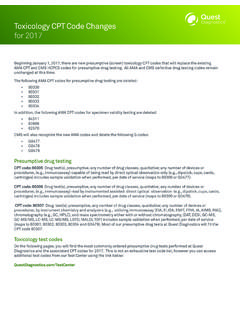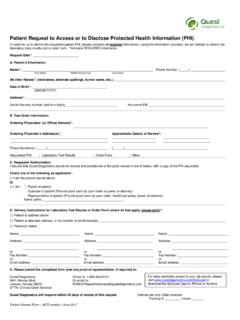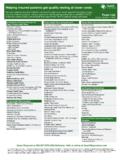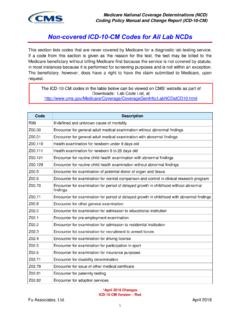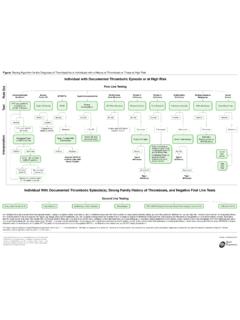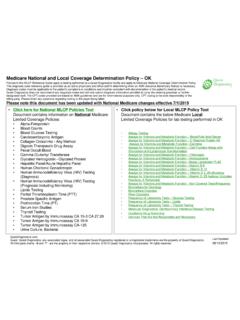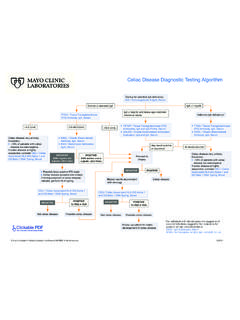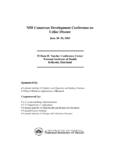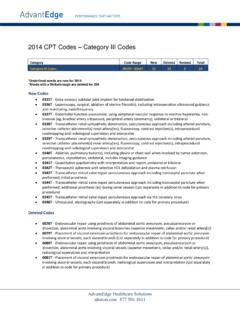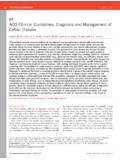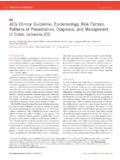Transcription of Celiac Disease Diagnosis - Quest Diagnostics
1 Diagnosis During your visit, your doctor may order blood tests to help see if you have a gluten-related disorder. These conditions include Celiac Disease , wheat allergy and non- Celiac gluten sensitivity. Let s visit each condition separately so that you can learn what to expect if your physician starts this process. Celiac Disease Diagnosis Celiac Disease is an autoimmune disorder that often runs in families. When someone with Celiac Disease eats gluten, the body causes an immune attack on the intestinal lining. Gluten is a protein found in wheat, barley, and rye, and their by-products.
2 Blood tests and a medical history taken by a medical professional are the first steps in a Diagnosis of Celiac Disease . A blood test will measure your body's response to gluten. Please note that in order for the blood tests to be helpful to your doctor, you must be eating a normal, gluten-containing diet. Your doctor may order one or more of the following laboratory tests to begin the Diagnosis of Celiac Disease : Total immunoglobulin A (Total IgA) Immunoglobulin A Tissue Transglutaminase (IgA-tTG) Immunoglobulin A Endomysial Antibody (IgA-EMA) If the individual is deficient in IgA, it is recommended that Immunoglobulin A / Immunoglobulin G- Deamidated Gliadin Peptide (IgA/IgG-DGP) also be ordered.
3 The IgA-tTG test can identify many adults and children who have Celiac Disease . The test is widely available and cost effective, too. If your blood test is positive, your physician may refer you to a gastroenterologist. This doctor may perform an upper gastrointestinal endoscopy. This medical procedure will allow your doctor to take a sample of your small intestine to see if you have Celiac Disease . You must also be on a normal, gluten-containing diet before this procedure in order for your doctor to tell if you have Celiac Disease . (So if you learn that you have a positive Celiac Disease blood test and are tempted to go on a gluten-free diet, think again.)
4 Learn why you should resist that temptation.) Special note: Although the IgA-tTG test is very helpful in identifying many individuals who have Celiac Disease , this blood test is not perfect. If your blood test is negative and your doctor remains suspicious that you have Celiac Disease , your doctor may consider using another blood test to determine if you do have this condition. For example, if an individual has a moderate to high risk of Celiac Disease but a normal IgA-tTG, a doctor may use the IgA-DGP blood test to guide a decision regarding the need for an endoscopy.
5 This is because some research shows that individuals with a normal IgA-tTG but who test positive for IgA-DGP do in fact have the intestinal damage typical of Celiac Disease . What should I expect during an endoscopy? An upper gastrointestinal endoscopy is a very safe and routine procedure. There are some things you will need to do to prepare for the procedure. Your doctor will talk about these important details with you. You may be lightly sedated during the procedure. The actual endoscopy only takes about 15 minutes. During the endoscopy, your doctor will use a small camera to look at your intestinal wall.
6 Your doctor will be looking for damage or flattening of the villi (small fingerlike projections that help to absorb nutrients from food). A few small samples will be taken to review under a microscope to confirm a Diagnosis of Celiac Disease . What should I do if I m already eating gluten-free? If your doctor suspects that you have Celiac Disease , and you are already on a gluten-free diet, he or she may suggest a gluten challenge. This will help your doctor give you a more definitive answer and also confirm whether the gluten-free diet is helping you. How is genetic testing helpful in the Diagnosis of Celiac Disease ?
7 Celiac Disease is a genetic condition, which means that it often runs in families. Genetic testing can be useful in certain situations when it comes to the process of diagnosing Celiac Disease . Genetic testing cannot diagnose Celiac Disease , but is a tool that can rule it out. Genetic testing is useful for individuals who are already on a gluten-free diet if their doctor thinks they may have Celiac Disease . It is also useful to test family members of persons with Celiac Disease . Because Celiac Disease runs in families, first and second-degree relatives are at an increased risk for the Disease .
8 The test will identify whether the individual has the genes associated with Celiac : HLA-DQ2 and HLA-DQ8. If a person doesn t have either of these genes, the likelihood of Celiac Disease is very low. If you test positive for the HLA-DQ2 or DQ8: This would indicate that you have a risk for developing the condition. However, it is important to know that many healthy people without Celiac Disease also have one or both of these genes. (Up to 40% of the population has these genes). You should discuss the next steps with your doctor. If you test negative for the HLA-DQ2 AND DQ8: This would indicate that you are very unlikely to develop Celiac Disease .
9 Non- Celiac Gluten Sensitivity Diagnosis Non- Celiac gluten sensitivity has many symptoms that overlap with Celiac Disease . So, it is impossible for doctors to decide if you have this Disease based only on symptoms. At the current time, there are no laboratory tests to see if you have this Disease . This is important to remember since some laboratories claim to diagnose non- Celiac gluten sensitivity. In order to diagnose non- Celiac gluten sensitivity doctors may first rule out Celiac Disease and wheat allergy. Then, doctors may put the individual on a gluten-free diet to see if symptoms go away.
10 If symptoms go away, they may then have the individual undergo a gluten-challenge. A doctor will decide you have non- Celiac gluten sensitivity if the gluten challenge shows that a gluten-free diet makes you better. Wheat Allergy A doctor can decide whether you have a wheat allergy based on one of two ways: a skin prick test or a blood test, such as ImmunoCAP . Both tests are very accurate. During a skin prick test, a drop of the allergen is placed on your forearm or back, and your skin is pricked so the allergen can enter your skin. This is done for each of your suspected allergens.
